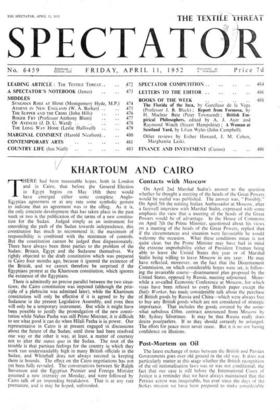Contacts with Moscow
On April 2nd Marshal Stalin's answer to the question whether he thought a meeting of the heads of the Great Powers would be useful was published. The answer was, "Possibly." On April 5th the retiring Indian Ambassador at Moscow, after a farewell interview with Marshal Stalin, expressed with some emphasis the view that a meeting of the heads of the Great Powers would be of advantage. In the House of Commons on April 7th the Prime Minister, questioned about his views on a meeting of the heads of the Great Powers, replied that if the circumstances and situation were favourable he would welcome the occasion. What these conditions mean is not quite clear, but the Prime Minister may have had in mind the extreme improbability either of President Truman being able to leave the United States this year or of Marshal Stalin being willing to leave Moscow in any year. He may have reflected, moreover, on the fact that the Disarmament Commission, on which considerable hopes were set, is follow- ing the invariable course—disarmament plan proposed by the United States, opposed by Russia, meeting adjourned. Mean- while a so-called Economic Conference at Moscow, for which visas have been refused to every British paper except the Daily Worker, has made considerable talk about the purchase of British goods by Russia and China—which were always free to buy any British goods which are not considered of strategic importance. That includes the goods covered by the some- what nebulous £10m. contract announced from Moscow by Mr. Sydney Silverman. It may be that Russia really does desire pourparlers. If so they should certainly be arranged. The effort for peace must never cease. But it is no use basing confidence on illusions.


































